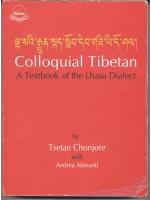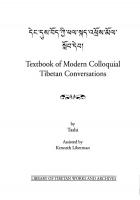Textbook of Modern Colloquial Tibetan Conversations. དེང་དུས་བོད་ཀྱི་ཕལ་སྐད་འཕྲོས་མོལ་སློབ་དེབ། 8185102570
Publisher: LIBRARY OF TIBETAN WORKS AND ARCHIVES Publication date: 2009 ISBN: 81-85102-57-0 Number of pages: 78 Language
201 43 1MB
English Pages [78] Year 2009
Recommend Papers
File loading please wait...
Citation preview
S ^ l Textbook of Modern Colloquial Tibetan Conversations
by
Tashi Assisted by Kenneth Liberman
LIBRARY OF TIBETAN WORKS AND ARCHIVES
Copyright ©: 1987 Library of Tibetan Works and Archives First Reprint: 1992 Second Reprint: 1993 Third Reprint: 2002 Fourth Reprint: 2009
All Rights Reserved Apart from any fair dealing for the purpose of private study or research, no part of this publication may be reproduced, stored in a retrieval system, or transmitted in any form or by any means, without prior permission of the publisher.
ISBN: 81-85102-57-0
Published by the Library of Tibetan Works and Archives, Dharamsala, H.P. and printed at Indraprastha Press (CBT), New Delhi-110002.
Foreword
This collection of informal conversations in modern Tibetan has been compiled to provide students ofTibetan language with an opportunity to practise speaking in everyday situations. Until recently interest in spoken Tibetan has largely been restricted to people in some way connected with the refugee community in exile. However, since Tibet itself is being increasingly opened to foreign tourists it is important that they should be able to communicate with the local Tibetan people, so we hope this book will also be of some help to them. The author, Mr. Tashi, has taught Tibetan language to foreign students for almost a decade during which time he has become familiar with the problems they face and has evolved these materials, amongst others, to suit their needs. During a sabbatical year in the U.S.A. he was assisted in preparing this book by Kenneth Liberman, Assistant Professor of Sociology at the University of Oregon, Eugene. They have been careful to ensure that the English translations follow the Tibetan as closely as possible in order to help students clearly understand both its meaning and form. Perhaps even more important than the book itself is the accompanying cassette on which all the conversations have been recorded in Tibetan, allowing the student further practice in the skills of speaking and listening. We are grateful to the authors for their efforts and hope this work will contribute to strengthening friendly communications between Tibetans and people of other lands.
Gyatsho Tshering Director
0(r^° q]%3^'
^ ,s I ^ ,^T^^7l^3;I^ ^ q,zy;^;q^I;,T3i,s^,a,ql^^3;J,q^^^,
Preface
The Textbook of Modern Colloquial Tibetan Conversation is written for those non-Tibetans who have keen interest in learning conversational Tibetan and who have already been studying the language. The textbook is based on the contemporary colloquial language in order to assist students to communicate directly with Tibetan people. It is based upon traditional Tibetan expression and relies upon the proper form and style used among Tibetans in their everyday life. In studying this book, students are advised to rely more heavily upon the tape than the book. The book should be consulted only when necessary, and students should continue their study until they are capable of listening to the entire tape with full comprehension without consulting the book.
Tashi (Daknewa)
\
4
Contents
1. Eight different short important conversations 1 2. Three different conversations about going to a restaurant 8 3. Going to a tea shop 17 4. Two short conversations asking for directions 19 5. Two short conversations on purchasing books and manuscripts from a shop 21 6. Going to a Tibetan hospital 24 7. A short talk on smoking 28 8. Going for a walk 30 9. A short conversation on Lhasa Apsos 32 10. A talk between Mr. Kalsang and Ms. Sangmo 34 11. A talk between a father and his son 37 12. A conversation on a child’s admission to the school 41 13. A conversation on pilgrimage 46 14. A short conversation on Gangchen Kyishong and the Library of Tibetan Works & Archives, Dharamsala 50 15. A short conversation on research 55 16. Notes 58 17. Glossary 59 18. A chart of genitives with examples 65 19. A chart of accusative, dative and location cases 66 20. Conjunction 67 21. The connective particles or conjunction 68 22. Dependent particles or conjunction 69
Eight different short important conversations
1
Tenpa:
What is your name?
^7*1 David:
My name is David,
q^a^l Where is your birthplace?
I am from New York. *W 1
S 5^ ' ^ ' ( ^ ' ) ‘T5'-^ What are you doing here?
’' ^ !
}^ \ I am studying here.
What are you studying? >%>1
' ^ ‘V 'F l I am studying spoken and written Tibetan.
Are spoken and written Tibetan not difficult?
Not so difficult. Its easy.
q ^ * ||
s ^ r q j q ’Ojq^j y ^ 3 f y q | ’3 ^ ’^ |
Tashi:
Ngodup-la, what time is it now?
c ^ rq jq j Ngodup:
Twenty minutes past two.
When will you go to the Office?
S)«nn
■
I will go to the office at ten minutes before 9 o’clock. ^ ’^ 1
^5|] Well then, at what time is lunch?
^ ' 3 ql Lunch is at exactly 12 o’clock.
qjlfl^-qy^qsr^J-SlS^SlI This evening, are you going to see the movie at 6:30? *y55r*jq]
arK'}] Yes. If [we] go that’s fine. Let’s leave from here around 6:15.
3 Sangye:
What is todays date?
Yeshe:
Isn’t today’s date the tenth? Yesterday’s date was the ninth, probably.



![English-Tibetan Dictionary of Modern Tibetan [1 ed.]
0520051572](https://ebin.pub/img/200x200/english-tibetan-dictionary-of-modern-tibetan-1nbsped-0520051572.jpg)


![English-Tibetan Dictionary of Modern Tibetan [1 ed.]
0520051572, 9780520051577](https://ebin.pub/img/200x200/english-tibetan-dictionary-of-modern-tibetan-1nbsped-0520051572-9780520051577-t-2538405.jpg)
![English-Tibetan Dictionary of Modern Tibetan [Reprint 2019 ed.]
9780520907485](https://ebin.pub/img/200x200/english-tibetan-dictionary-of-modern-tibetan-reprint-2019nbsped-9780520907485.jpg)
![The New Tibetan-English Dictionary of Modern Tibetan [2 ed.]
0520204379](https://ebin.pub/img/200x200/the-new-tibetan-english-dictionary-of-modern-tibetan-2nbsped-0520204379.jpg)
![English-Tibetan Dictionary of Modern Tibetan [1 ed.]
0520051572, 9780520051577](https://ebin.pub/img/200x200/english-tibetan-dictionary-of-modern-tibetan-1nbsped-0520051572-9780520051577.jpg)
